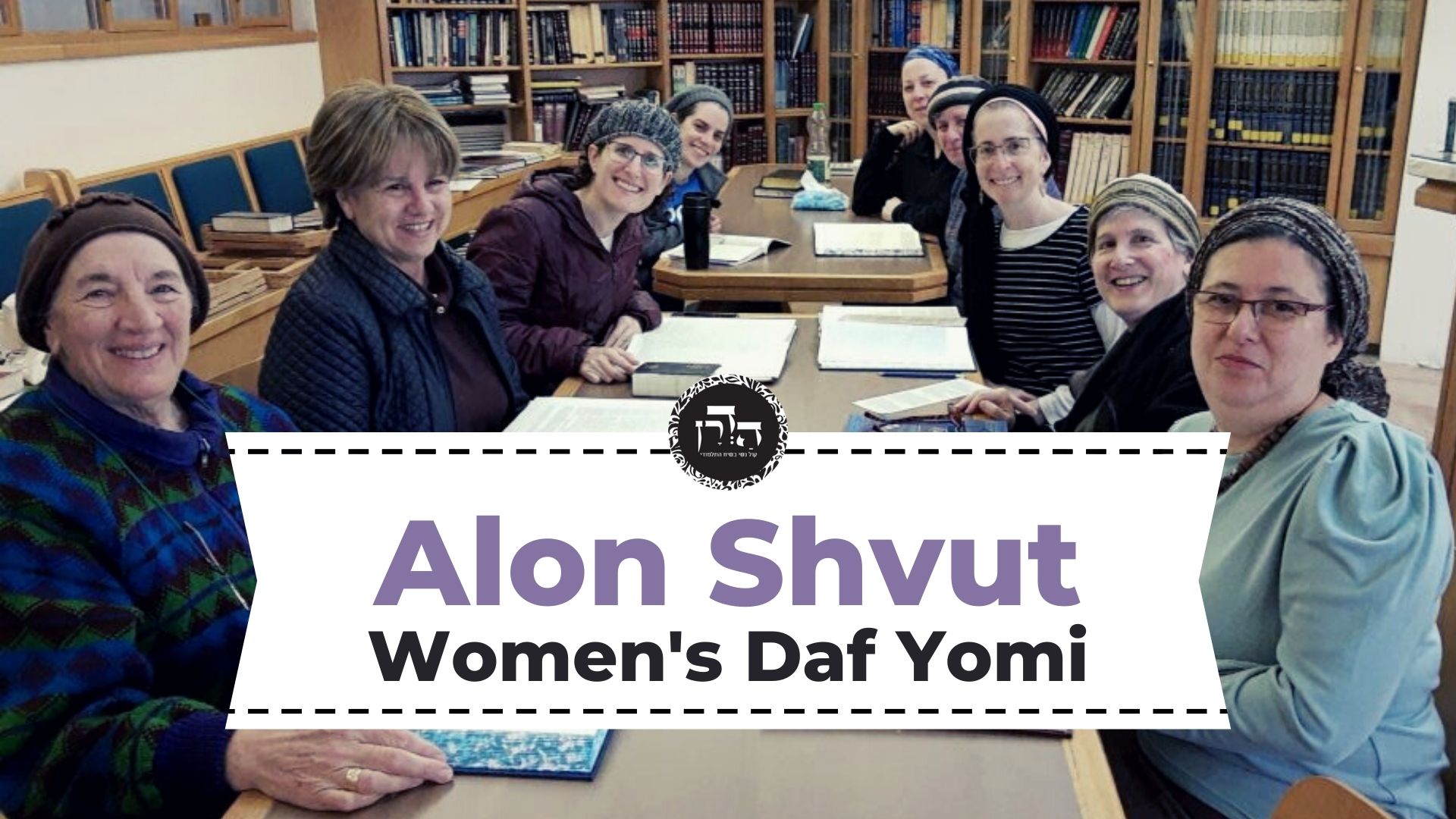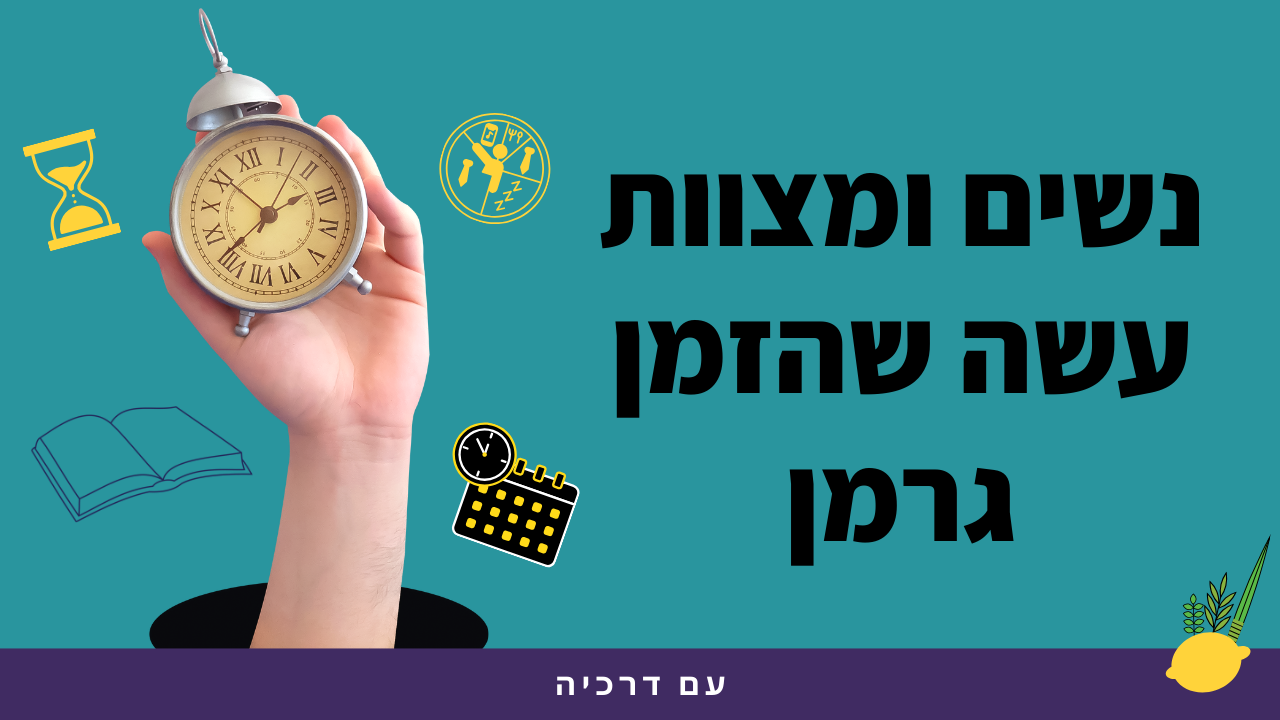If the tenth and eleventh comes out together and the owner calls them “tenth”, what are the different opinions regarding the halacha? If his messenger makes a mistake, is it the same as if the owner did, or is it different?
This week’s learning is sponsored for the merit and safety of Haymanut (Emuna) Kasau, who was 9 years old when she disappeared from her home in Tzfat two years ago, on the 16th of Adar, 5784 (February 25, 2024), and whose whereabouts remain unknown.
This week’s learning is dedicated of the safety of our nation, the soldiers and citizens of Israel, and for the liberation of the Iranian people. May we soon see the realization of “ליהודים היתה אורה ושמחה וששון ויקר”.
This week’s learning is sponsored for the merit and safety of Haymanut (Emuna) Kasau, who was 9 years old when she disappeared from her home in Tzfat two years ago, on the 16th of Adar, 5784 (February 25, 2024), and whose whereabouts remain unknown.
Want to dedicate learning? Get started here:


Today’s daily daf tools:
This week’s learning is sponsored for the merit and safety of Haymanut (Emuna) Kasau, who was 9 years old when she disappeared from her home in Tzfat two years ago, on the 16th of Adar, 5784 (February 25, 2024), and whose whereabouts remain unknown.
This week’s learning is dedicated of the safety of our nation, the soldiers and citizens of Israel, and for the liberation of the Iranian people. May we soon see the realization of “ליהודים היתה אורה ושמחה וששון ויקר”.
This week’s learning is sponsored for the merit and safety of Haymanut (Emuna) Kasau, who was 9 years old when she disappeared from her home in Tzfat two years ago, on the 16th of Adar, 5784 (February 25, 2024), and whose whereabouts remain unknown.
Today’s daily daf tools:
Delve Deeper
Broaden your understanding of the topics on this daf with classes and podcasts from top women Talmud scholars.
New to Talmud?
Check out our resources designed to help you navigate a page of Talmud – and study at the pace, level and style that fits you.
The Hadran Women’s Tapestry
Meet the diverse women learning Gemara at Hadran and hear their stories.
Bekhorot 61
וְהָא דְּתָנֵי יִקְרְיבוּ — רַבִּי שִׁמְעוֹן הִיא, דְּאָמַר: מְבִיאִין קָדָשִׁים לְבֵית הַפְּסוּל.
And the ruling of this tanna, who teaches: Both animals must be sacrificed, is in accordance with the opinion of Rabbi Shimon, who says that one may bring sacrificial animals to a situation where the likelihood of disqualification is increased.
וְהָא דְּתָנֵי יָמוּתוּ — רַבִּי יְהוּדָה הִיא, דְּאָמַר: טָעוּת מַעֲשֵׂר, תְּמוּרָה הָוְיָא, קָסָבַר רַבִּי יְהוּדָה: תְּמוּרַת מַעֲשֵׂר מֵתָה.
And the ruling of this tanna, who teaches: Both animals must die, is in accordance with the opinion of Rabbi Yehuda, who says: When the owner makes a mistake in designating animal tithe, e.g., if one designates the ninth animal as the tenth, the designated animal has the status of a substitute animal. And Rabbi Yehuda holds that a substitute for an animal tithe must be left to die. Since it is uncertain which animal is the eleventh, both are left to die.
וְקָסָבַר רַבִּי יְהוּדָה תְּמוּרַת מַעֲשֵׂר מֵתָה? וְהָתְנַן, אָמְרוּ מִשּׁוּם רַבִּי מֵאִיר: אִילּוּ הָיָה תְּמוּרָה לֹא הָיָה קָרֵב, מִכְּלָל דְּרַבִּי יְהוּדָה סָבַר קָרֵב!
The Gemara asks: And does Rabbi Yehuda hold that a substitute for an animal tithe must die? But didn’t we learn in the mishna: The Sages said in the name of Rabbi Meir, in response to the statement of Rabbi Yehuda: The eleventh animal is not considered a substitute for the animal tithe, since if it were a substitute it would not be sacrificed, as the substitute for an animal tithe is not sacrificed?By inference, Rabbi Yehuda holds that the eleventh animal is sacrificed, and not put to death, despite the fact that it has the status of a substitute animal.
וְכִי תֵּימָא: רַבִּי מֵאִיר לְמַאי דִּסְבִירָא לֵיהּ קָאָמַר, וְהָתַנְיָא: אֵין בֵּין אַחַד עָשָׂר לִשְׁלָמִים, אֶלָּא שֶׁזֶּה עוֹשֶׂה קְדוּשָּׁה לִיקְרַב, וְזֶה אֵין עוֹשֶׂה קְדוּשָּׁה לִיקְרַב, דִּבְרֵי רַבִּי יְהוּדָה. קָדוֹשׁ לִיקְרַב הוּא דְּלָא הוּא עָבֵיד, הָא אִיהוּ גּוּפֵיהּ קָרֵיב!
The Gemara continues: And if you would say that Rabbi Meir is saying his statement according to what he himself holds, and therefore nothing can be inferred from his comment with regard to the opinion of Rabbi Yehuda, that cannot be so; but isn’t it taught in a baraita: The difference between the eleventh animal mistakenly designated as animal tithe and a peace offering is only that this, the peace offering, renders a substitute sanctified to the extent that it can be sacrificed, but that, the eleventh animal mistakenly designated as animal tithe, does not render its substitute sanctified to be sacrificed; this is the statement of Rabbi Yehuda? The Gemara infers: It is stated only that the eleventh animal mistakenly designated as tithe does not render its substitute sanctified with enough sanctity to be sacrificed, which indicates the eleventh animal itself is sacrificed and not put to death.
וְעוֹד, דְּתַנְיָא: ״אִם מִן הַבָּקָר״ — לְרַבּוֹת אַחַד עָשָׂר לִשְׁלָמִים.
And furthermore, there is a source that indicates that Rabbi Yehuda holds that a mistakenly designated animal tithe is sacrificed, as it is taught in a baraita in the Sifra: “And if his offering be a sacrifice of peace offerings: If he sacrifice of the herd, whether male or female, he shall sacrifice it without blemish before the Lord” (Leviticus 3:1). This serves to include the eleventh animal mistakenly designated as tithe; it must be sacrificed as a peace offering.
יָכוֹל שֶׁאֲנִי מְרַבֶּה אַף הַתְּשִׁיעִי? אָמַרְתָּ: וְכִי הֶקְדֵּשׁ לְפָנָיו מְקַדֵּשׁ אוֹ לְאַחֲרָיו מְקַדֵּשׁ? הֱוֵי אוֹמֵר — לְאַחֲרָיו מְקַדֵּשׁ.
One might have thought that I include even the ninth animal mistakenly designated as the tithe. You say in rejection of this suggestion: But does consecration sanctify a substitute before the original animal is sanctified, or does it sanctify only after the original animal is sanctified? You must say that it sanctifies only after the original animal is sanctified. If so, only the eleventh animal is sacrificed as a peace offering, but not the ninth.
סְתָם סִיפְרָא מַנִּי? רַבִּי יְהוּדָה, וְקָתָנֵי: ״מִן הַבָּקָר״ — לְרַבּוֹת אַחַד עָשָׂר לִשְׁלָמִים.
And who is the author of the unattributed statement in the Sifra? It is Rabbi Yehuda. And the baraita is teaching that the verse: “If he sacrifice of the herd, whether male or female, he shall sacrifice it without blemish before the Lord,” serves to include the eleventh animal mistakenly designated as tithe, i.e., to teach that it must be sacrificed as a peace offering. Evidently, Rabbi Yehuda does not hold that the eleventh animal mistakenly designated as tithe must die.
אֶלָּא תַּרְגְּמַהּ רַבִּי שִׁמְעוֹן בְּרַבִּי אַבָּא קַמֵּיהּ דְּרַבִּי יוֹחָנָן: בְּמַעֲשֵׂר בִּזְמַן הַזֶּה עָסְקִינַן, וּמִשּׁוּם תַּקָּלָה.
If so, in accordance with whose opinion is the baraita that rules that in a case where two animals emerged together as the tenth, and the owner called them both the tenth, they must both die? It cannot be in accordance with the opinion of Rabbi Yehuda. Rather, Rabbi Shimon, son of Rabbi Abba, interpreted that baraita before Rabbi Yoḥanan: We are dealing with animal tithe in the present time, and the animals must die due to concern that a mishap might occur, as one might shear them or put them to work, or eat them before they develop a blemish.
אִי הָכִי, מַאי אִירְיָא תְּרֵי? אֲפִילּוּ חַד נָמֵי! לָא מִיבַּעְיָא קָאָמַר: לָא מִיבַּעְיָא חַד דְּלֵית לֵיהּ פְּסֵידָא, אֲבָל תְּרֵי, כֵּיוָן דִּנְפִישִׁי פְּסֵידָא — לִישַׁהִינְהוּ עַד דְּנִיפּוֹל בְּהוּ מוּמָא וְלֵיכְלִינְהוּ, קָא מַשְׁמַע לַן.
The Gemara asks: If so, why is the baraita referring specifically to a case where two animals left the pen at the same time? The same would hold true even with regard to one animal designated as tithe, as it cannot be sacrificed nowadays. The Gemara answers: The tanna is speaking utilizing the style of: It is not necessary. It is not necessary to teach that in a case where one animal was designated as tithe it must die, as there is no major financial loss. But in a case where two animals were designated as tithe, since the loss is great one might think he should leave them until they develop a blemish, and then eat them. Therefore, the tanna teaches us that even in a case where two animals were designated as tithe, both must die.
אִיתְּמַר: הָאוֹמֵר לִשְׁלוּחוֹ ״צֵא וְעַשֵּׂר עָלַי״, רַב פַּפִּי מִשְּׁמֵיהּ דְּרָבָא אָמַר: קָרָא לַתְּשִׁיעִי ״עֲשִׂירִי״ — קָדוֹשׁ, וְלָאַחַד עָשָׂר ״עֲשִׂירִי״ — אֵינוֹ קָדוֹשׁ. וְרַב פָּפָּא אָמַר: אֲפִילּוּ קָרָא לַתְּשִׁיעִי ״עֲשִׂירִי״ — אֵינוֹ קָדוֹשׁ, דְּאָמַר לֵיהּ: לְתַקּוֹנֵי שַׁדַּרְתָּיךָ וְלָא לְעַוּוֹתֵי.
It was stated: In the case of one who says to his agent: Go and separate animal tithe on my behalf, Rav Pappi says in the name of Rava: If he called the ninth animal the tenth, it is sanctified and may not be eaten until it has developed a blemish. The owner is not particular about this error, as the animal is not rendered entirely prohibited. But if he designated the eleventh animal as the tenth it is not sanctified as a peace offering, as the owner would not tolerate losing the animal entirely. And Rav Pappa disagrees and says: Even if the agent called the ninth animal the tenth it is not sanctified, as the owner who sent him can say to him: I sent you to act for my benefit and not to my detriment. The authority to serve as an agent does not extend to a case where he acts to the detriment of the one who designated him.
וּמַאי שְׁנָא מֵהָא דִּתְנַן: הָאוֹמֵר לִשְׁלוּחוֹ ״צֵא וּתְרוֹם״ — תּוֹרֵם כְּדַעַת בַּעַל הַבַּיִת.
The Gemara asks: And in what manner is the case of animal tithe different from that which we learned in a mishna (Terumot 4:4): With regard to one who says to his agent: Go and separate teruma, the agent separates teruma in accordance with the intention of the homeowner. He must separate the amount that he assumes the owner would want to give, as there is no fixed measure that one must set aside as teruma. A generous person gives as much as one-fortieth of his produce as teruma, while a stingy person can give one-sixtieth.
אִם אֵינוֹ יוֹדֵעַ דַּעְתּוֹ שֶׁל בַּעַל הַבַּיִת — תּוֹרֵם בְּבֵינוֹנִית, אֶחָד מֵחֲמִשִּׁים. פִּיחֵת עֲשָׂרָה אוֹ הוֹסִיף עֲשָׂרָה — תְּרוּמָתוֹ תְּרוּמָה?
The mishna continues: If he does not know the intention of the homeowner he separates an intermediate measure, i.e., one-fiftieth of the produce. If he subtracted ten from the denominator and separated one-fortieth of the produce, or added ten to the denominator and separated one-sixtieth, his teruma is considered teruma. In this case too, the owner should also be able to say he did not send the agent to act to his detriment, and therefore the act of separating teruma should not take effect.
אָמְרִי: הָתָם, כֵּיוָן דְּאִיכָּא דְּתָרֵים בְּעַיִן יָפָה, וְאִיכָּא דְּתָרֵים בְּעַיִן רָעָה, אָמַר: לְהָכִי אֲמַדְתִּיךְ. הָכָא טָעוּתָא הִיא, אָמַר: לָא אִיבְּעִי לָךְ לְמִיטְעֵי.
The Sages say in answer: There, with regard to teruma, since there are those who separate teruma generously and there are those who separate teruma sparingly, the agent can say: I estimated that you were one such as this, i.e., either generous or stingy. But here, with regard to animal tithe, it is a mistake, and therefore the owner can say: I did not want you to make a mistake.
הֲדַרַן עֲלָךְ מַעְשַׂר בְּהֵמָה, וּסְלִיקָא לַהּ מַסֶּכֶת בְּכוֹרוֹת.








































